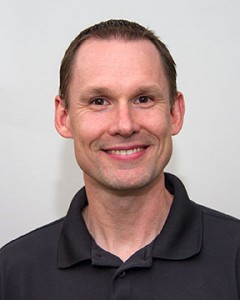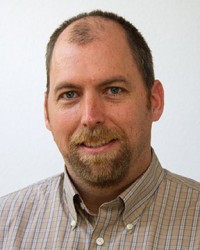Posted 11:23 a.m. Friday, May 27, 2016

NSF grant allows undergraduate research experience in mathematics, ecology.
NSF grant allows undergraduate research experience in mathematics, ecology
UWL faculty will work on cutting-edge research projects with college students from across the country using a $280,500 National Science Foundation grant. UWL will host 24 students over the next three summers as part of a research experience for undergraduates (REU). Guided by UWL mathematicians and scientists, the first group of eight students will arrive Monday, June 6, for 10 weeks. They’ll work projects rooted in the Coulee Region with wide-spanning applications. As understanding of the natural world grows, so does the complexity of the problems that researchers encounter. The research groups will divide in two to study topics at the intersection of mathematics and ecology using mathematical and statistical methods. [caption id="attachment_46166" align="alignright" width="200"] Greg Sandland, associate professor of biology.[/caption]
One group of four students will study the spread of parasites in snails and waterfowl in the Upper Mississippi River with Greg Sandland, associate professor of biology and James Peirce, an associate professor of mathematics. The other group will assist Eric Eager, assistant professor of mathematics, with research on how windmills change migratory patterns and affect bird and bat populations. Eager’s group will also be mentored by Richard Erickson, a U.S. Geological Survey (USGS) scientist.
[caption id="attachment_46173" align="alignleft" width="200"]
Greg Sandland, associate professor of biology.[/caption]
One group of four students will study the spread of parasites in snails and waterfowl in the Upper Mississippi River with Greg Sandland, associate professor of biology and James Peirce, an associate professor of mathematics. The other group will assist Eric Eager, assistant professor of mathematics, with research on how windmills change migratory patterns and affect bird and bat populations. Eager’s group will also be mentored by Richard Erickson, a U.S. Geological Survey (USGS) scientist.
[caption id="attachment_46173" align="alignleft" width="200"] Eric Eager, assistant professor of mathematics.[/caption]
UWL selected the students through a competitive application process. “Research is hard. We try to tackle problems no one has solved before,” says Eager. “When we look at student profiles, we look for evidence they can do this. And that is something we aim to sharpen.”
Hosting a Research Experience for Undergraduates (REUs) is also prestigious, says Eager. About a quarter of the nearly 50,000 proposals reviewed by NSF in 2015 were funded, according to the agency’s 2015 financial report.
In addition to their research experience, students will also do professional development activities throughout the summer. They will participate in workshops and panels preparing them for graduate school, professional conferences, research dissemination and collaboration.
[caption id="attachment_46171" align="alignright" width="200"]
Eric Eager, assistant professor of mathematics.[/caption]
UWL selected the students through a competitive application process. “Research is hard. We try to tackle problems no one has solved before,” says Eager. “When we look at student profiles, we look for evidence they can do this. And that is something we aim to sharpen.”
Hosting a Research Experience for Undergraduates (REUs) is also prestigious, says Eager. About a quarter of the nearly 50,000 proposals reviewed by NSF in 2015 were funded, according to the agency’s 2015 financial report.
In addition to their research experience, students will also do professional development activities throughout the summer. They will participate in workshops and panels preparing them for graduate school, professional conferences, research dissemination and collaboration.
[caption id="attachment_46171" align="alignright" width="200"] James Peirce, associate professor of mathematics.[/caption]
UWL has hosted similar summer research programs for UWL students; however, hosting external students is also important, says Eager.
“It’s a badge of honor in academics to have [research] residencies in multiple places,” notes Eager. “Our students also apply for research experiences for undergraduates at other locations across the country.”
Bringing in students representing the far reaches of the country also benefits the UWL campus, says Eager. “Students bring the culture of their institution to yours and that is exciting.”
Wind farms and bat migration
Eager will lead research with a USGS scientist on how windmills affect bat migration patterns with a USGS scientist. Massive wind farms are being erected throughout the heart of America, which has posed concerns for scientists about what that means for migratory patterns and populations, explains Eager. Eager previously published mathematical research showing that windmills more negatively affect bird populations that take longer to reproduce. He looks forward to diving more deeply into the topic during the research experience for undergraduates this summer. Results could give ecologists qualitative and broad ideas about what is happening so they can communicate with conservation managers and politicians to construct wind farms with as little impact on bird and bat populations as possible.
James Peirce, associate professor of mathematics.[/caption]
UWL has hosted similar summer research programs for UWL students; however, hosting external students is also important, says Eager.
“It’s a badge of honor in academics to have [research] residencies in multiple places,” notes Eager. “Our students also apply for research experiences for undergraduates at other locations across the country.”
Bringing in students representing the far reaches of the country also benefits the UWL campus, says Eager. “Students bring the culture of their institution to yours and that is exciting.”
Wind farms and bat migration
Eager will lead research with a USGS scientist on how windmills affect bat migration patterns with a USGS scientist. Massive wind farms are being erected throughout the heart of America, which has posed concerns for scientists about what that means for migratory patterns and populations, explains Eager. Eager previously published mathematical research showing that windmills more negatively affect bird populations that take longer to reproduce. He looks forward to diving more deeply into the topic during the research experience for undergraduates this summer. Results could give ecologists qualitative and broad ideas about what is happening so they can communicate with conservation managers and politicians to construct wind farms with as little impact on bird and bat populations as possible.